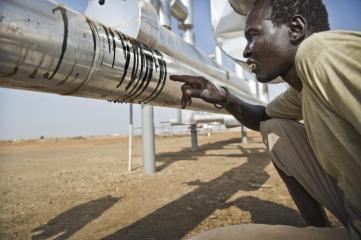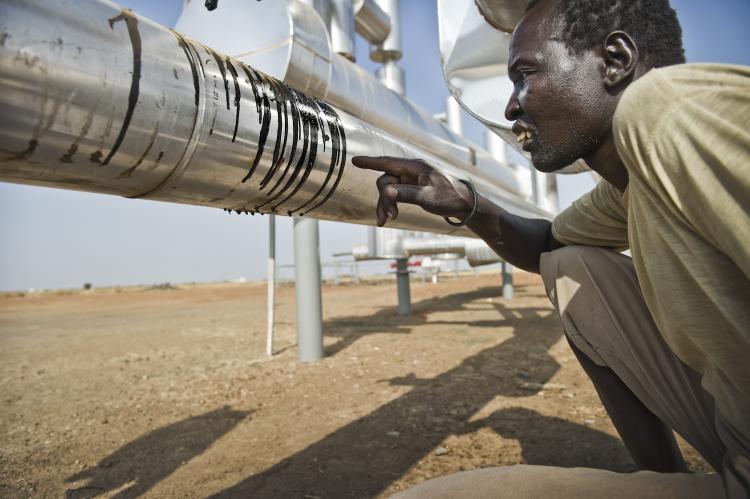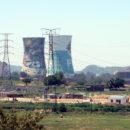South Sudan’s Doomsday Machine – By Alex de Waal

 The below op-ed contribution was published online by the International Herald Tribune–Global Opinion, on January 24, 2012.
The below op-ed contribution was published online by the International Herald Tribune–Global Opinion, on January 24, 2012.
South Sudan was born as an independent nation on July 9, 2011, with good will and a bounty. Three hundred and fifty thousand barrels of oil per day provided the government with $1,000 per year for each of its 8 million citizens.
But the only pipeline to market runs through northern Sudan, giving the government in Khartoum control over South Sudan’s economic artery. And on independence day there was no agreement on the terms of pipeline use.
When Sudan was still one country, 50 percent of the revenue from southern oil went to the central treasury, comprising 40 percent of its budget. After July 9, Khartoum received nothing “” not even a transit fee. International promises of debt relief and lifting economic sanctions, to fill a part of the budget gap, came to nothing. Continued negotiations “” convened by the African Union High-Level Implementation Panel on Sudan, which is headed by former President Thabo Mbeki of South Africa and to which I am an adviser “” have failed to resolve the issue.
On Jan. 20, South Sudan announced the dramatic step of shutting down oil production, with immediate effect. As oil money comprises 97 percent of the South’s budget, it seems a suicidal step. The rationale is that for the last month, Khartoum has been diverting the oil to its own refinery and filling three tankers.
A year ago, President Omar al-Bashir congratulated his southern counterpart, President Salva Kiir, on independence and promised a new and peaceable chapter in the troubled history of north-south relations. This quickly turned sour, particularly with the outbreak of war in two areas of northern Sudan “” Southern Kordofan and Blue Nile “” where about half of the population is loyal to the former rebels of the Sudan People’s Liberation Movement, who are now the government in the South. Although the northern branch of the party supposedly split off, the South does not disguise its solidarity with its former comrades in arms.
Khartoum’s delegates to the just-concluding talks in Addis Ababa complain bitterly. “Why should we allow Southern oil to go free to market, when the money from its sales is used to arm rebels who want to destroy us?” They follow it up with a promise “” we will reconcile our respective claims after we agree on a transit fee that matches a third of the budget gap.
The South counters, “Why do we allow our oil to be stolen and the money used to buy weapons to kill our comrades in arms? Khartoum has always wanted to control the South and its readiness to strangle us financially shows that they will never allow us to be truly free.” The Southern government in Juba has floated plans for a new pipeline through Kenya. Optimistically, this may cost $3 billion to $4 billion and take three years to build, but many Southern leaders would rather leave their oil in the ground than submit to Sudan’s coercion.
So South Sudan has set off its economic doomsday machine. The shutdown of wells is already beginning and within a week the oil companies will begin flushing the pipeline with water, so that the oil it contains doesn’t jam and turn into a 600-mile asphalt tube. After that, the best case would be six months’ work to reopen exports.
The South’s lead negotiator, Pagan Amum, said he was at peace with himself when he explained: “This is a matter of respect. We may be poor but we will be free.”
But South Sudan is a fragile state, as the recent interethnic killings in the Jonglei area show, and it will need massive foreign aid to compensate for the lost $650 million per month.
A northern general remarked, “The shutdown will hurt us but it will kill them.” But Sudan cannot be stable if its southern neighbor is in crisis.
Based on its principle that Sudan and South Sudan should be two viable states, at peace and mutually supportive, the African Union panel has proposed an agreement. This will keep the oil flowing, stop the unilateral diversion of southern oil by the north, and provide enough funds to cushion the economic crisis in the north. China “” the main buyer of Sudanese oil “” the United States and the United Nations have endorsed the African Union’s plan.
President Bashir and President Kiir are due to meet in Addis Ababa on Friday. This is the last chance, not only for the two to snatch a deal on oil, but also to stop an escalation into a wider north-south war. The two must step back from the brink.
Alex de Waal is the executive director of the World Peace Foundation.






[…] Aside from nationality issues, a severe economic crisis and high food inflation contribute to general insecurity in Sudan. Khartoum was built on oil wealth; when Sudan was still united, southern oil comprised 40 percent of the country’s budget. Since the split, Sudan has received neither oil payments nor transit fees. […]
[…] Aside from nationality issues, a severe economic crisis and high food inflation contribute to general insecurity in Sudan. Khartoum was built on oil wealth; when Sudan was still united, southern oil comprised 40 percent of the country’s budget. Since the split, Sudan has received neither oil payments nor transit fees. […]